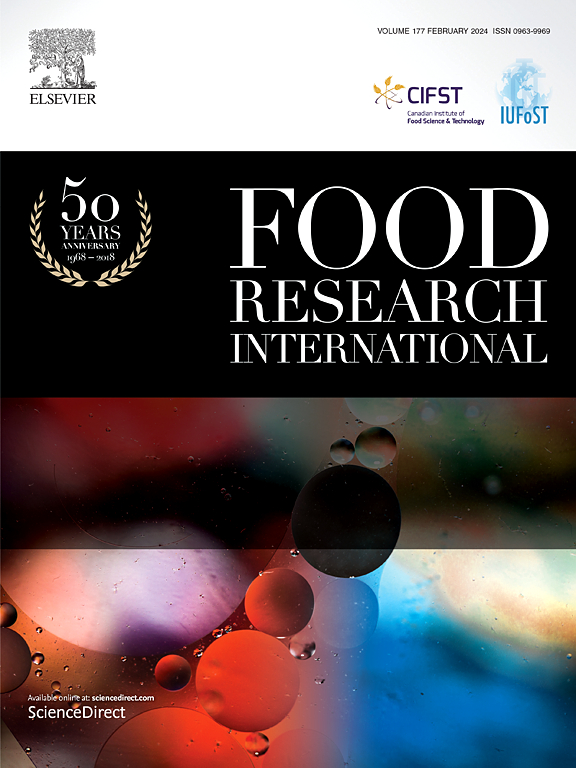Changes in urinary metabolomics after meat-containing meals with and without cruciferous or apiaceous vegetables indicate modulation of nucleotide metabolism in addition to xenobiotic metabolism: A randomized crossover study
IF 7
1区 农林科学
Q1 FOOD SCIENCE & TECHNOLOGY
引用次数: 0
Abstract
Colon cancer is a prevalent malignancy influenced by genetics and environmental factors. Diets rich in charred and fried red meats, thus high in heterocyclic aromatic amines [e.g., 2-amino-1-methyl-6-phenylimidazo[4,5-b]pyridine (PhIP)], are associated with increased colon cancer risk. Conversely, the consumption of fruits and vegetables offers protective effects, potentially modulating multiple carcinogenesis-related pathways. Here, we investigated the metabolomic response to apiaceous and cruciferous vegetable consumption in relation to concomitant PhIP consumption. In a randomized crossover design, 25 participants underwent four phases with four different test meals at the end of each phase. Test meals were well-done hamburger (Control), Control plus cruciferous vegetables (Cru), Control plus apiaceous vegetables (Api), and Control plus combined vegetable types (Cru + Api). Urine samples were subjected to metabolomics analysis using UPLC-MS/MS system. A total of 660 metabolites were identified. The Cru and Api meals showed distinct metabolite profiles, and the Cru + Api meal induced 133 metabolite changes compared to Control. Meals with cruciferous vegetables enriched S-methylcysteine, S-methylcysteine sulfoxide, N-acetylproline, sulforaphane-related compounds, and xenobiotic and amino acid metabolites the most. The Api meal was not as effective in altering xenobiotic metabolites. Api primarily elevated mannitol/sorbitol. To a lesser extent, both vegetable-supplemented meals induced changes in nucleotide-derived metabolites suggesting potential epigenetic modifications. The findings reinforce the influence of these vegetables on xenobiotic metabolism pathways, highlight potential epigenetic mechanisms and potential biomarkers of food intake, and provide further elucidation of their possible roles in colon cancer prevention.
一项随机交叉研究表明,在含或不含十字花科或蜜蜂类蔬菜的肉类餐后,尿代谢组学的变化表明除了外源代谢外,核苷酸代谢也受到调节
结肠癌是一种常见的恶性肿瘤,受遗传和环境因素的影响。饮食中富含烧焦和油炸的红肉,因此富含杂环芳香胺[例如,2-氨基-1-甲基-6-苯基咪唑[4,5-b]吡啶(PhIP)],与结肠癌风险增加有关。相反,水果和蔬菜的消费具有保护作用,可能调节多种致癌相关途径。在这里,我们研究了代谢组学对蜂科和十字花科蔬菜消费与伴随PhIP消费的关系。在随机交叉设计中,25名参与者经历了四个阶段,每个阶段结束时有四种不同的测试餐。试验餐为熟透的汉堡包(对照)、对照加十字花科蔬菜(Cru)、对照加十字花科蔬菜(Api)和对照加组合蔬菜(Cru + Api)。采用UPLC-MS/MS系统对尿样进行代谢组学分析。共鉴定出660种代谢物。与对照组相比,Cru + Api组可诱导133种代谢物发生变化。十字花科蔬菜餐富含s -甲基半胱氨酸、s -甲基半胱氨酸亚砜、n -乙酰脯氨酸、萝卜硫素相关化合物以及异种生物和氨基酸代谢物最多。原料药餐在改变异种代谢物方面效果不明显。Api主要是升高甘露醇/山梨醇。在较小程度上,两种蔬菜膳食都引起了核苷酸衍生代谢物的变化,这表明可能存在表观遗传修饰。这些发现强化了这些蔬菜对外源代谢途径的影响,强调了潜在的表观遗传机制和潜在的食物摄入生物标志物,并进一步阐明了它们在结肠癌预防中的可能作用。
本文章由计算机程序翻译,如有差异,请以英文原文为准。
求助全文
约1分钟内获得全文
求助全文
来源期刊

Food Research International
工程技术-食品科技
CiteScore
12.50
自引率
7.40%
发文量
1183
审稿时长
79 days
期刊介绍:
Food Research International serves as a rapid dissemination platform for significant and impactful research in food science, technology, engineering, and nutrition. The journal focuses on publishing novel, high-quality, and high-impact review papers, original research papers, and letters to the editors across various disciplines in the science and technology of food. Additionally, it follows a policy of publishing special issues on topical and emergent subjects in food research or related areas. Selected, peer-reviewed papers from scientific meetings, workshops, and conferences on the science, technology, and engineering of foods are also featured in special issues.
 求助内容:
求助内容: 应助结果提醒方式:
应助结果提醒方式:


